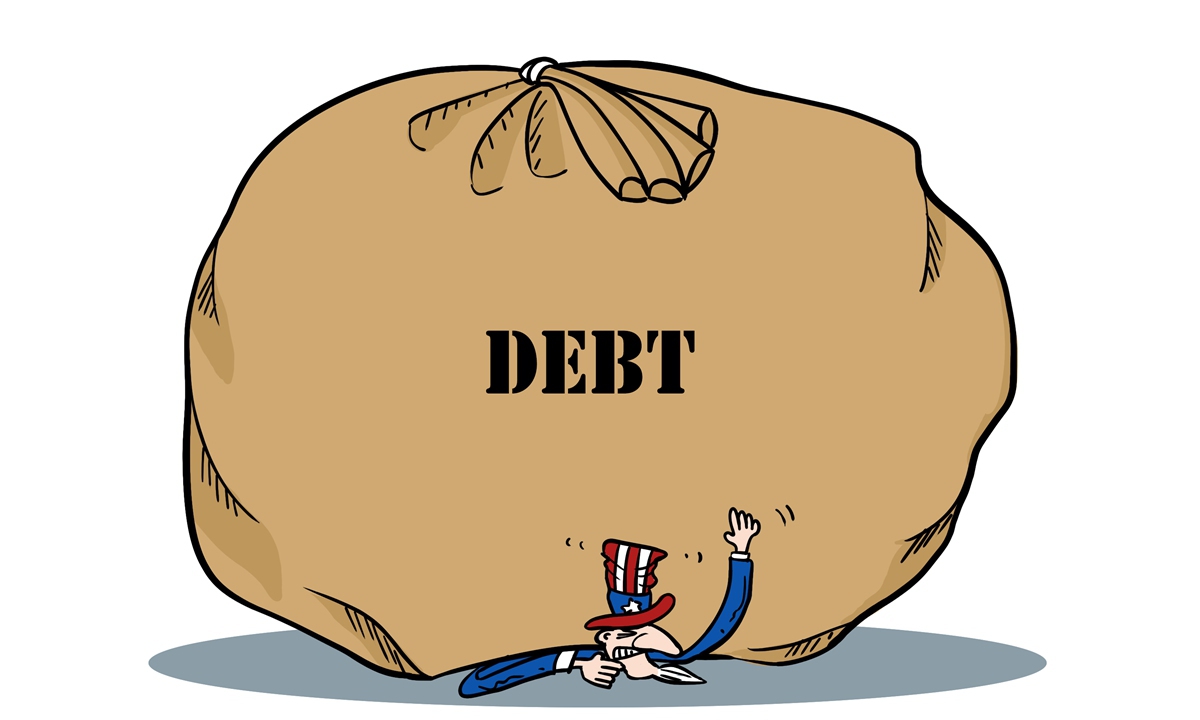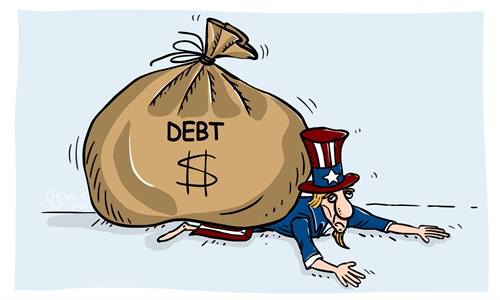
Illustration: Chen Xia/GT
Every few years, America's debt ceiling showdown takes the world economy over the precipice of disastrous financial crisis and deep recession. As the measures of raising or suspending the debt limit are now a routine to stave off an imminent default, America's bizarre sovereign default crisis has become a growing threat to the world.The US House of Representatives on Tuesday approved a legislation to temporarily raise the government's borrowing limit to $28.9 trillion, which US President Joe Biden is expected to sign into law before October 18, pushing off the deadline for a sovereign default until December, Reuters reported.
Despite the fighting between the two parties, most have little doubt that Republicans and Democrats will come to their senses, albeit leaving it as late as possible. This is because everyone knows that the consequences of defaulting on its debt would be both destructive and disastrous, and could see the US credit hurt, the dollar's value plunge and global financial markets collapse.
The US debt ceiling crisis that rolls around every few years is both an economic and political battle. The two parties often exchange accusations of fiscal malfeasance, disregard for soaring debt, leaving the country exposed to default risks, which not only creates uncertainties but also increases odds that the US may default.
What's even worse, however, is the fact that the US national debt is on an unsustainable trajectory, which has essentially become a ticking time bomb for the global economy. First of all, generous fiscal stimulus to bail out businesses and families has driven national debt skyrocket in an out-of-control manner. Secondly, the economy is growing much slower than its debt, dashing the hope for a strong economic rebound in the post-pandemic era. The development is somehow close to what happened in the past when some countries experienced debt crises.
While the US government continues to ignore this ticking time bomb by raising or suspending the debt limit, there are fears that a delayed crisis may come with a higher price, and the US debt crisis may be the biggest threat to the world economy.
Even if the US averts its debt default by raising the debt ceiling, it should be noted that its growing debt burden has already damaged the world economy by pushing up inflation, still leaving the global markets to risks of financial crisis.
Yet, at a time when the US debt burden is causing real difficulties for the global economy, it is incredulous to see some US politicians and Western media outlets to be more interested in China's debt problem.
US Secretary of State Antony Blinken recently urged China to act "responsibly" when it comes to addressing the potential impact of China Evergrande Group's financial crisis, Bloomberg reported. There have also been some Western media reports that hyped up Evergrande's debt default to suggest a debt crisis in China could rattle global markets. These media outlets never mention that actively deflating the real estate bubbles is actually part of China's economic adjustment in an aim to lay the foundation for its future development.
Diverting global attention from the real threat of US debt crisis underscores Western media outlets' double standards on viewing debt issues, which may be the only thing they can do to cover the US inability to solve its looming debt crisis.


